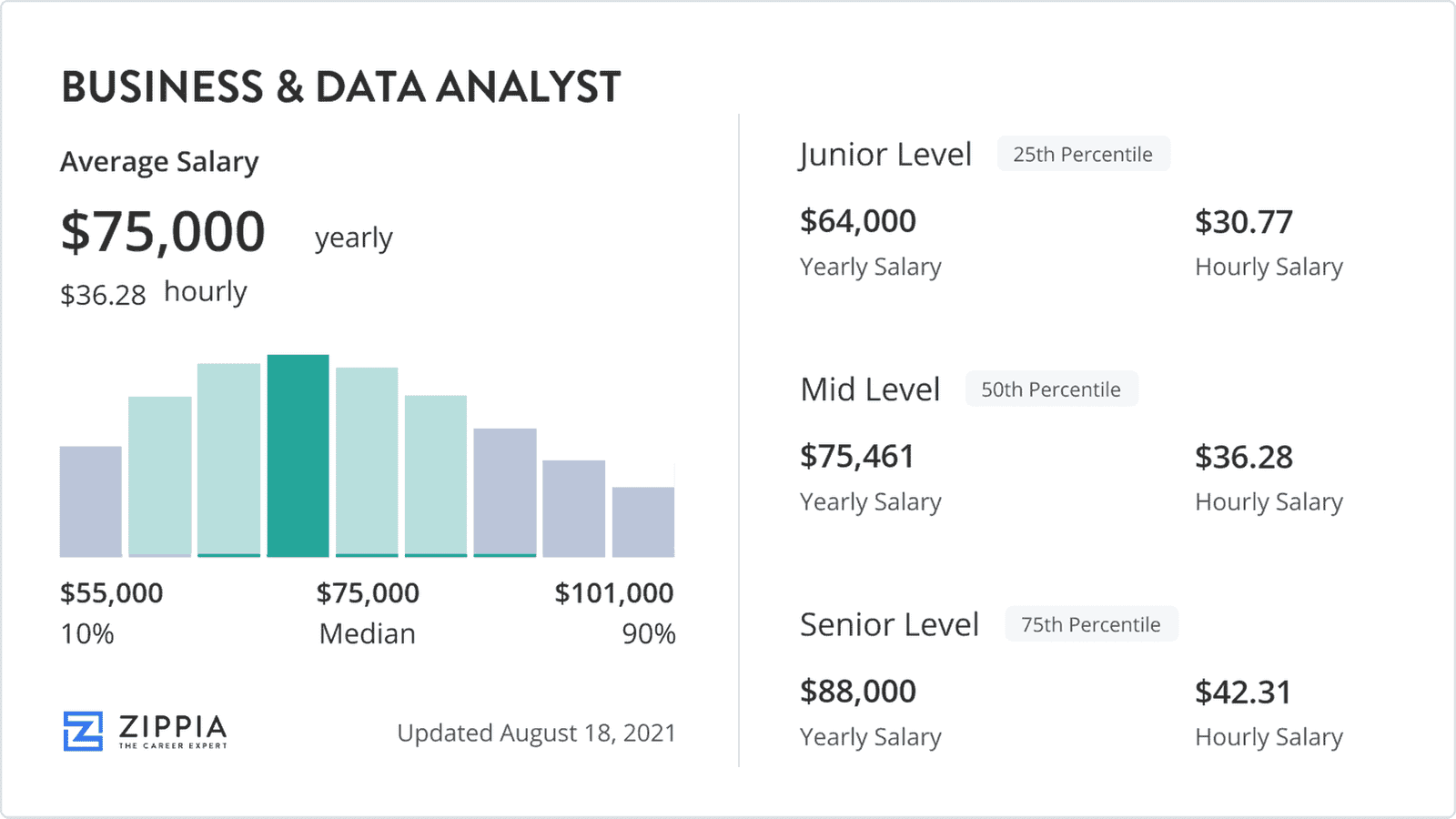Different job roles are becoming increasingly popularised in the rapidly growing technological market and data plays a significant role in it. With the help of crucial and valuable data, it has become possible for business organisations to make important decisions. From predicting future trends to understanding data using visualisation, data is everywhere. However, in order to deal with these large volumes of data, the role of a business data analyst is indispensable. What is a Business Data Analyst and why is the role important today? Let’s find out.
What is a Business Data Analyst?
The role of a Business Data Analyst in the market is quite dynamic but highly important. While many of you may confuse it with the role of a Data Analyst, there are quite a few differences. Business Data Analysts are professionals who act as a middle ground between technology and business domains within an organisation. It is a trusted role endowed with the responsibility of analysing business and documenting organisational processes. Additionally, a Business Data Analyst is also responsible for evaluating business models and suggesting new changes in technology. Furthermore, improving existing processes, products, services and software, performing data analysis and identifying loopholes, are all part of the job role of a Business Data Analyst.
What does a Business Data Analyst Do?
Business Data Analysts are certainly in charge of the numbers for a business, recording and evaluating organisational processes and business models in the industry. They responsible for analysing the findings and provide advice to organisations on improving the technology. With the presence of numerous business challenges, Business Data Analysts contributes to the success of a business by providing solutions. Additionally, they also utilise research for expanding consumer base for a business.
Importance of Business Data Analyst:
The role of a Business Data Analyst seems to be highly crucial in the world today because of its multi-dimensional benefits which involves managing various aspects of a firm. It acts as a bridge between the IT and business teams enabling to find profitable avenues of growth. With the growth and advancement of the modern digital technology, the importance of a Business Data Analyst today has been increasing more and more.
Business Data Analysts are responsible for analysing the historical data of an organisation for optimising the business operations. In order to do so they identify the existing loopholes thereby enabling optimum utilisation of resources thus, saving a considerable amount of expenditure for the business. With these processes, it is possible for organisations to free up their monetary and human resources thus, giving them more flexibility for indulging in projects.
While it is stated that Business Data Analysts acts as a bridge between the technological and non-tech departments, it implies they are responsible for understand demands of non-it sector. Business Data Analysts ensure that they carefully plan out solutions in dealing with non-IT challenges even without bringing out any differences. With the implementation of new technologies, they help in improving business functions and reduces time taken for completing tasks.
Furthermore, Business Data Analysts are important today because they help in making digital transformation easier for an organisation. They essentially simplify the complexities involved in digitisation and help businesses to optimise on time and resources by making use of data-driven decision.
The role a Business Data Analyst in a Team:
Considering the importance of Business Data Analyst today, their role within a team is highly crucial. Accordingly, being a data-driven professional, Business Data Analysts act as agents for the organisation. They ensure that technologies and business processes are always in sync.
The purpose of Business Data Analyst is to regularly examine and analyse the collected data by the firm and ensure that they provide recommendations for improvements regularly. Generally, these professionals are highly concerned with the development and improvement of solutions that will help organisations to position themselves as market leaders. Thus, having only data-related expertise is not enough.
Business Analyst vs Data Analyst: Is there a Difference?
One of the most frequently asked questions is what is the difference between Business Analyst and Data Analyst. Despite the fact that these roles sound similar, there are quite a few differences which can be explained as follows:
1. Data Analyst:
Data Analysts are responsible for analysing large amounts of data in order to get insights and views on the market. most of the time they spend are involved in creating and providing reports to executives who make final business decisions.
Furthermore, these professionals are highly responsible for undertaking database administration and maintenance. The job’s analytics and operational responsibilities meet in this respect.
2. Business Analyst:
The primary difference of Business Analyst from a Data Analyst focuses on the emphasis of the former on business strategy. Business Analysts focus most of their time in identifying the improvement needs of a firm. They analyse the procedures of the business and make notes on the areas where improvements are required.
The role of a Business Analyst is management-oriented and most of them hold the qualification in Business Administration and economics. Their expertise allow them to become qualified in data analysis and pursue the career of Business Analyst in the future.
Their ability to manage ithers is what enables them to make their own decisions and judgements. They are able to identify secure and high-potential paths for the businesses based on their analysis and insights.
What skills does a Business Data Analyst need to have?
A Business Analyst might require certain key skills and meet certain criteria that employers generally look for, ensuring that their technological expertise meets business requirements. Following are the criteria that employers look for in Business Data Analysts:
- Extensive knowledge in data including investigation and analysis.
- Familiarity in using SQL Databases
- Having advanced skills in communication like ability to collaborate with different departments in a company.
- Thorough knowledge on the project management processes with the ability to detect and deal with crucial data.
- SAP knowledge
- Skilled in statistics and mathematics
- Proficiency in presentation platforms, data administration in spreadsheets and development of reports.
How does one become a Business Data Analyst?
In order to become a Business Data Analyst, you do not need to follow a certain path or route. you can get a job as a Business data Analyst by following certain key aspects which are the requirements for you to get hired as one. Accordingly, following are the business Data Analyst requirements:
- A bachelor’s degree in management like Business Management or related field.
- Specialised education in Data Analysis.
- Expertise in database management systems and SQL
- Understanding of the role of working as an analyst in the entry-level position.
- Considering the corporate jobs and Business Analyst being a lucrative career choice, the possibility of you reaching at top ranks and positions is quite high. accordingly, pursuing Data Analytics course by Pickl.AI will help you to become skills in database management, SQL programming as well as enable you to understand the role of an entry-level analyst.
Read Blog: How to Build a Data Analyst Portfolio?
Business Data Analyst Job Prospects and Salary:
(Source: https://www.zippia.com/business-data-analyst-jobs/salary/)
The demand for Business Data Analyst is increasing with time and at an unprecedented level. while there are quite a few challenges in finding skilled business data analysts, it has created a situation where the demand for the role is higher than the supply of talents. This makes the Business Data Analyst job role highly lucrative in the market.
You need to make sure that for pursuing a career as a Business Data Analyst, you should have certification and specialisation in Data Analyst Course for competitive advantage. You must have an efficient Business Data Analyst resume prepared for yourself that will allow you to expand your possibilities of gaining a position in the market. as part of you journey, you might benefit if you gain Business Data Analyst Internship as part of your entry-level job role.
The business Data Analyst salary can be quite promising in the market and the exact figures depend on experience level, job location or industry type. In India, the average Business Data Analyst salary is ₹ 7 lakhs. Consequently, Data Analyst vs Business Analyst salary differs with the former having an average salary of ₹ 4 Lakhs per annum.
Conclusion
As the world is progressing in a Digitised era, decision-making processes become more complex and data-driven. The role of the Business Data Analyst is henceforth, highly crucial for organisations to progress using new technologies and improve customer satisfaction. Pursuing the online Data Analytics course by Pickl.AI will take you one step closer to your dream job role.












